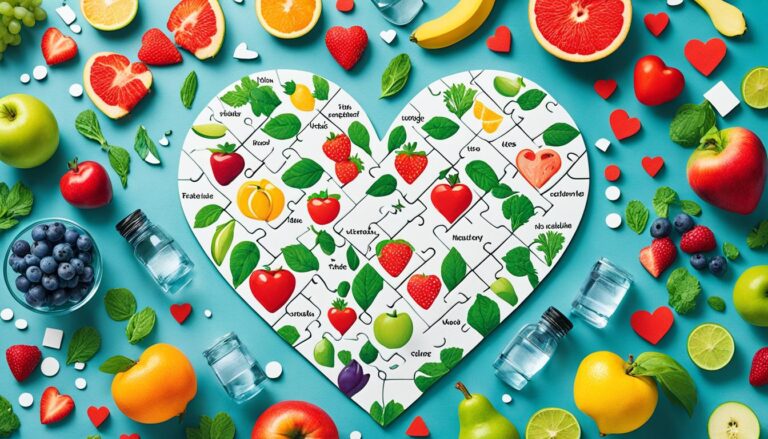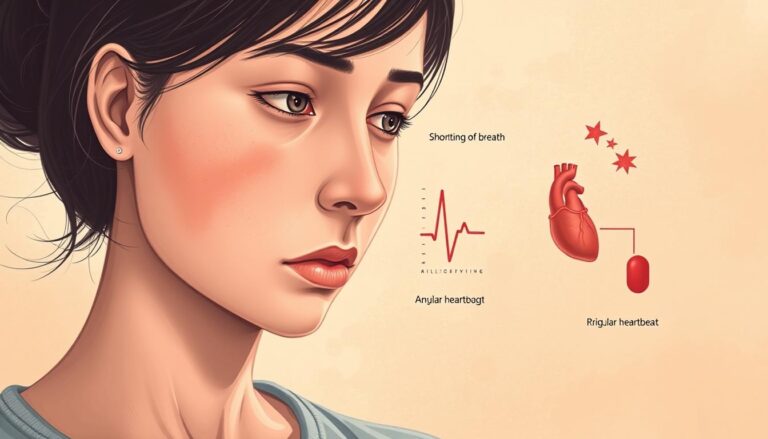When fighting cancer your diet could be your strongest ally. Many think pesticides and pollution are the main enemies but diet is key.
The American Institute for Cancer Research says only 8% of our diet is from foods that help fight cancer. Imagine boosting your health by adding the right foods to your meals. Get ready to learn about the top anti-cancer superfoods you should have at home.
Key Takeaways
- Only 8% of the standard American diet consists of cancer fighting foods.
- Fruits, vegetables whole grains, legumes, fish, and nuts are among the most potent cancer-fighting foods.
- These foods contain a variety of protective compounds like antioxidants, fiber and anti-inflammatory nutrients.
- Incorporating a diverse range of these foods into your diet can significantly lower your risk of developing various types of cancer.
- Modifying your diet is one of the most impactful ways to reduce your cancer risk, even more so than minimizing exposure to environmental toxins.
Cancer-Fighting Power of Berries
Berries are packed with antioxidants and are great for fighting cancer. These fruits are full of phytochemicals like anthocyanins, ellagic acid, and resveratrol. These can help prevent cancer in many ways.
The bright colors of berries show how full they are of antioxidants. These compounds fight off harmful free radicals. This reduces oxidative stress and inflammation. Both are big factors in cancer.
Studies show that eating berries often can lower the risk of cancers like colon, breast, and prostate. The berry phytochemicals can stop tumor growth and DNA damage. They also make cancer cells die off without harming healthy ones.
Berries are easy to add to your diet and taste great. Enjoy them as a snack, in salads, or blended into smoothies. They’re a key food for anyone wanting to boost their health and fight cancer.
Berries are a nutritional powerhouse, packed with antioxidants and other compounds that can help protect against cancer.

| Berry | Antioxidant Capacity | Cancer-Fighting Compounds |
|---|---|---|
| Blueberries | High | Anthocyanins, flavonoids, resveratrol |
| Raspberries | High | Ellagic acid, anthocyanins, quercetin |
| Blackberries | Very high | Anthocyanins, ellagic acid, vitamin C |
| Strawberries | High | Ellagic acid, vitamin C, folate |
Cruciferous Veggies A Potent Cancer Fighter
Cruciferous vegetables like broccoli, cauliflower, bok choy, cabbage, and Brussels sprouts are great for fighting cancer. They are full of compounds that help fight cancer. These veggies should be a key part of a healthy diet.
The name cruciferous means cross-bearing in Latin, because the leaves have a cross shape. These veggies may look different but they share nutrients that help fight cancer.
Indole-3 carbinol is a key compound in these veggies that fights cancer. It helps stop cancer cells from growing and lowers the risk of prostate, colorectal, and breast cancer.
Cruciferous veggies also have glucosinolates that turn into compounds that fight inflammation and lower cancer risk. These compounds are important for health.
| Cruciferous Veggie | Cancer Fighting Benefits |
|---|---|
| Broccoli | High in sulforaphane, a compound that may help prevent prostate, breast, colon, and oral cancers. |
| Cauliflower | Contains indole 3-carbinol, which has been shown to inhibit the growth of cancer cells. |
| Cabbage | Rich in glucosinolates, which break down into compounds that may reduce inflammation and lower cancer risk. |
| Brussels Sprouts | A good source of antioxidants and fiber, both of which are important for cancer prevention. |
To get the most health benefits, roast or sauté these veggies with olive oil or 100% maple syrup. Don’t boil them, as that can lower the good stuff like glucosinolates and vitamin C.
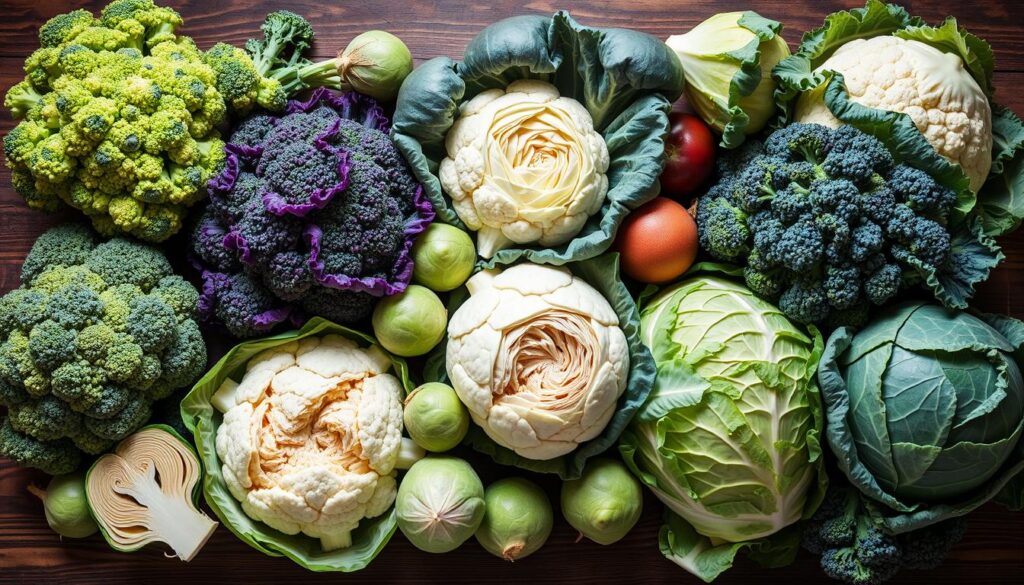
Eating five servings of vegetables and two servings of fruit per day can have a positive impact on health.
Adding different types of cruciferous veggies to your meals is an easy way to fight cancer and stay healthy.
Omega 3 Rich Fish Reducing Inflammation and Cancer Risk
Oily fish like salmon, tuna, and anchovies are great for fighting inflammation and cancer. They are full of omega-3 fatty acids. These fish are like superheroes for your health.
Omega-3 fatty acids are known for reducing inflammation. This can help fight cancer. Eating at least two servings of omega-3-rich fish a week can lower heart disease risk. The American Heart Association suggests this to keep your heart healthy.
But there’s more to these fish. Research shows they might help prevent cancer too. A study found omega-3s can lower C-reactive protein levels. This protein is linked to higher cancer risks, like breast and colorectal cancer.
Adding more omega-3-rich fish to your meals is simple. Try baking or grilling salmon with a citrus-herb mix. Canned tuna or sardines are great for salads and sandwiches. And anchovies can make any dish taste better, from pasta to Caesar salads.

Eating fish rich in omega-3 fatty acids seems to be better for heart health than taking supplements.
Next time you’re cooking think about the health benefits of omega-3-rich fish. They’re tasty and can help fight inflammation and cancer.
Nuts A Nutrient Dense Cancer Fighting Snack
Nuts are packed with nutrients and may help prevent cancer. The American Institute for Cancer Research says nuts, like walnuts, can fight cancer. They are full of fiber, healthy fats, and compounds that may stop cancer from happening.
Walnuts have lots of antioxidants and anti-inflammatory stuff that slows down cancer cell growth. This is good for the prostate and breast. Brazil nuts give you a lot of selenium which can lower the risk of lung, prostate, and colorectal cancer.
| Nut | Cancer Fighting Compounds |
|---|---|
| Walnuts | Antioxidants, anti-inflammatory compounds |
| Brazil Nuts | Selenium |
| Almonds | Vitamin E, flavonoids, phenolic acids |
| Pistachios | Carotenoids, vitamin E, gamma-tocopherol |
Other nuts like almonds, hazelnuts, pine nuts, pecans, and pistachios have good stuff too. They have vitamin E flavonoids, and other compounds that help fight cancer.
Eating different nuts can be a tasty way to lower your cancer risk. Just remember, nuts have a lot of calories. Add them to your diet in moderation. Enjoy them as part of a diet full of other foods that fight cancer.
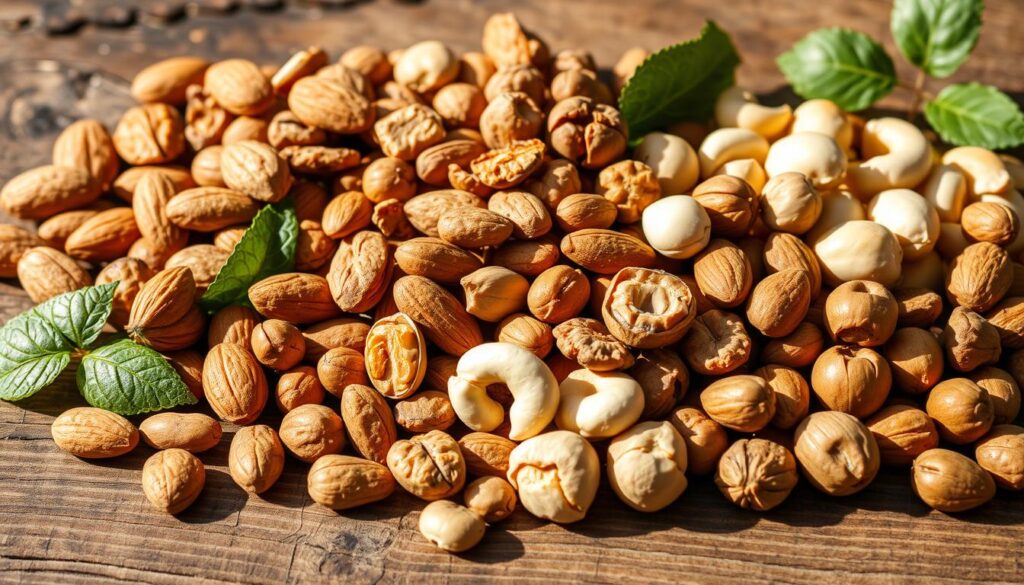
What is the most anti cancer food?
No single food can stop cancer, but eating a variety of whole, plant based foods helps lower cancer risk. The American Cancer Society says only 8% of our diet is from foods that fight cancer. Many people don’t know how a diet rich in whole food cancer prevention can help.
A plant-based diet and cancer risk are linked. Studies show eating a mix of fruits, vegetables, and whole grains can lower cancer risk. Foods like berries and cruciferous veggies are packed with compounds that fight cancer.
| Food | Cancer-Fighting Compounds | Potential Cancer Benefits |
|---|---|---|
| Berries | Anthocyanins, ellagic acid, resveratrol | Reduced risk of bladder and esophageal cancer |
| Cruciferous Vegetables | Sulforaphane, indole-3-carbinol | Lower risk of colon, lung, breast, and prostate cancers |
| Fatty Fish | Omega-3 fatty acids | Reduced mortality from all cancer risk |
| Nuts and Seeds | Antioxidants, healthy fats | Potential reduction in prostate and breast cancer risk |
| Turmeric | Curcumin | Inhibits cancer cell growth and reduces inflammation |
While no single food can stop cancer, eating a variety of plant-based diet and cancer risk can help. Adding whole food cancer prevention foods to your daily meals is key to a healthier life and lower cancer risk.
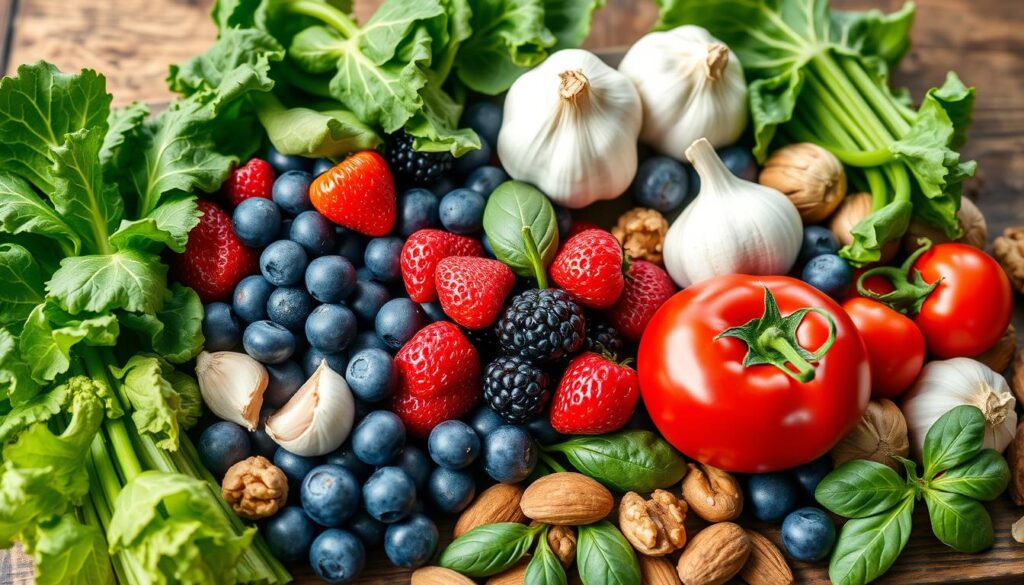
Eating a diet rich in a variety of plant-based foods is one of the best ways to reduce your cancer risk. American Cancer Society
The Power of Legumes in Cancer Prevention
Legumes like beans, lentils, peas, and chickpeas are full of cancer fighting nutrients. They are high in fiber and contain vitamins, minerals, and antioxidants. These can help protect against colon and breast cancer.
Studies have linked eating legumes to a lower cancer risk. For example, eating legumes more than four times a week can cut colon cancer risk by 50%. Another study showed that beans can slow down or even kill tumor cells. This suggests they could help prevent and manage cancer.
Adding more legumes to your diet is simple and tasty. You can put them in soups, stews, salads, or eat them alone. Legumes are easy to find, affordable, and great for fighting cancer.
Legumes are a wonderful source of fiber, protein, and antioxidants that can help reduce inflammation and lower the risk of certain cancers. They’re a true superfood when it comes to cancer prevention.
If you want to boost your cancer defenses, eat more legumes. Your body and taste buds will appreciate it!
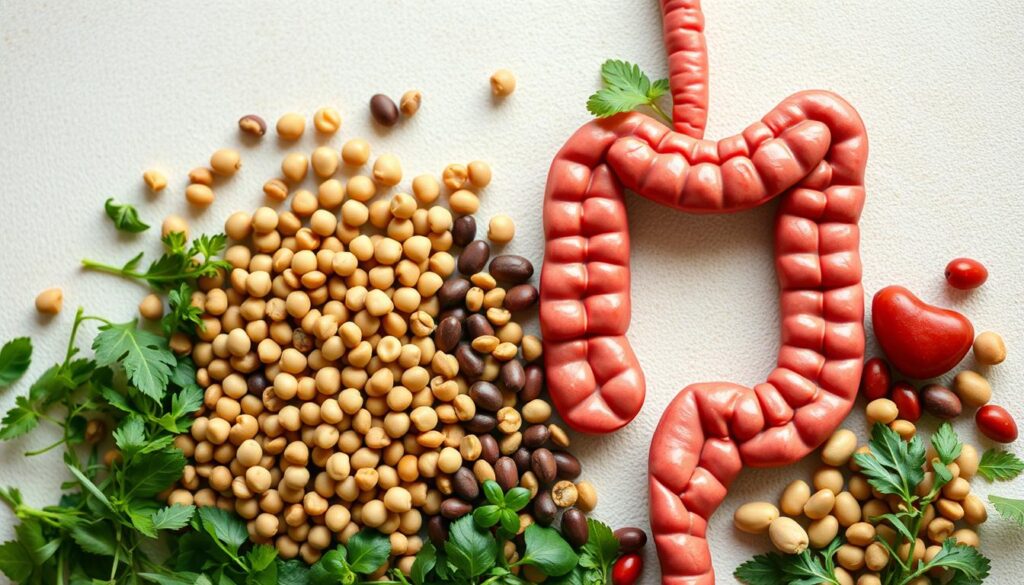
Dark Chocolate A Sweet Treat with Cancer Fighting Benefits
Indulge in the dark side literally. Dark chocolate, with its high cocoa content can be a delightful ally in the fight against cancer. It’s packed with fiber antioxidants, and minerals. This treat may help lower the risk of certain types of the disease.
The secret lies in the cocoa bean, the source of chocolate. These plant seeds are a rich source of polyphenols and flavanols. These compounds help your gut’s healthy bacteria grow. Studies show they can fight free radicals linked to cancer.
Observational research links higher chocolate intake with lower risks of breast, prostate colorectal cancer, and non Hodgkin’s lymphoma. But, results from intervention trials on dark chocolate’s role in cancer prevention are mixed. One study found it didn’t significantly affect cell growth or apoptosis in pancreatic cancer patients.
Not all dark chocolate is created equal. Higher cocoa percentage is better for health benefits due to more concentrated flavonoids, while added sugars and fats can diminish potential protective effects.
The key is moderation. Eating too much dark chocolate can lead to weight gain, increasing cancer risks. Too many antioxidants can also be harmful.
So, how can you enjoy this dark delight? Aim for a square or two of 70% to 90% dark chocolate after dinner and savor the complex flavors. Remember, a little goes a long way with cocoa bean polyphenols and gut health and cancer.
Whole Grains Fiber Rich and Cancer Protective
Whole grains like rolled oats, brown rice, and 100% whole wheat bread are great for fighting cancer. They are full of antioxidants and fiber. Eating more whole grains can lower the risk of 18 types of cancer. Each 10-gram increase in fiber from these foods is linked to a 7% lower risk of colorectal cancer.
To get the most cancer-fighting benefits from whole grains, choose products with at least 3 grams of fiber per serving. Focus on breads, cereals, and other grain-based foods that are truly whole grain. This helps your body get the nutrients it needs to fight cancer cells.
The more people consume wholegrains and foods containing dietary fibre, the lower the risk of some cancers.
Antioxidants in whole grains are key to their protective effects. These compounds neutralize free radicals that can harm DNA and lead to cancer. The fiber in whole grains also supports a healthy digestive system. This may lower the risk of colorectal cancer by promoting regular bowel movements and reducing harmful substances in the colon.
Adding whole grains to your diet is a step towards preventing cancer. Enjoy the fiber and antioxidants they offer. This can give you peace of mind, knowing you’re feeding your body well against cancer.
Leafy Greens: Carotenoid-Packed Cancer Fighters
Dark leafy greens like spinach and kale are full of carotenoids. These are antioxidants that help fight leafy greens and cancer prevention. They are loaded with lutein and zeaxanthin. These have been shown to lower the risk of breast, prostate, and lung cancers.
Many Americans don’t eat enough dark greens and cancer risk because they don’t like the taste. To make them more enjoyable, try massaging the greens. This breaks down the fibers. Kale is a tough green that stays fresh for days. You can use it in salads or sauté it with garlic and olive oil.
Leafy greens are very versatile. You can use them in salads, sautés, soups, casseroles, or as a pesto for pasta. Adding more leafy greens and cancer prevention to your meals gives your body a strong defense against cancer.
Leafy greens are a nutritional powerhouse, packed with cancer-fighting carotenoids that may help protect against a range of malignancies.
No single food can stop cancer alone. But eating a diet full of carotenoids and tumor growth – and dark greens and cancer risk-fighting foods is great for your health. It can also lower your cancer risk.
Conclusion
There’s no single food that can stop cancer on its own. But, eating a variety of cancer-fighting foods regularly can help. Foods like berries and fish have special compounds that fight cancer.
It’s best to eat a diet full of whole foods. This means lots of fruits, veggies, beans, whole grains, nuts, and fermented foods. These foods work together to help your body fight off cancer and lower your risk. Making small changes to your diet can make a big difference in preventing cancer.
Don’t worry too much about finding the best anti-cancer food. Just focus on eating a variety of colorful, healthy foods. This way, you’ll be taking good care of your body and enjoying delicious meals.



